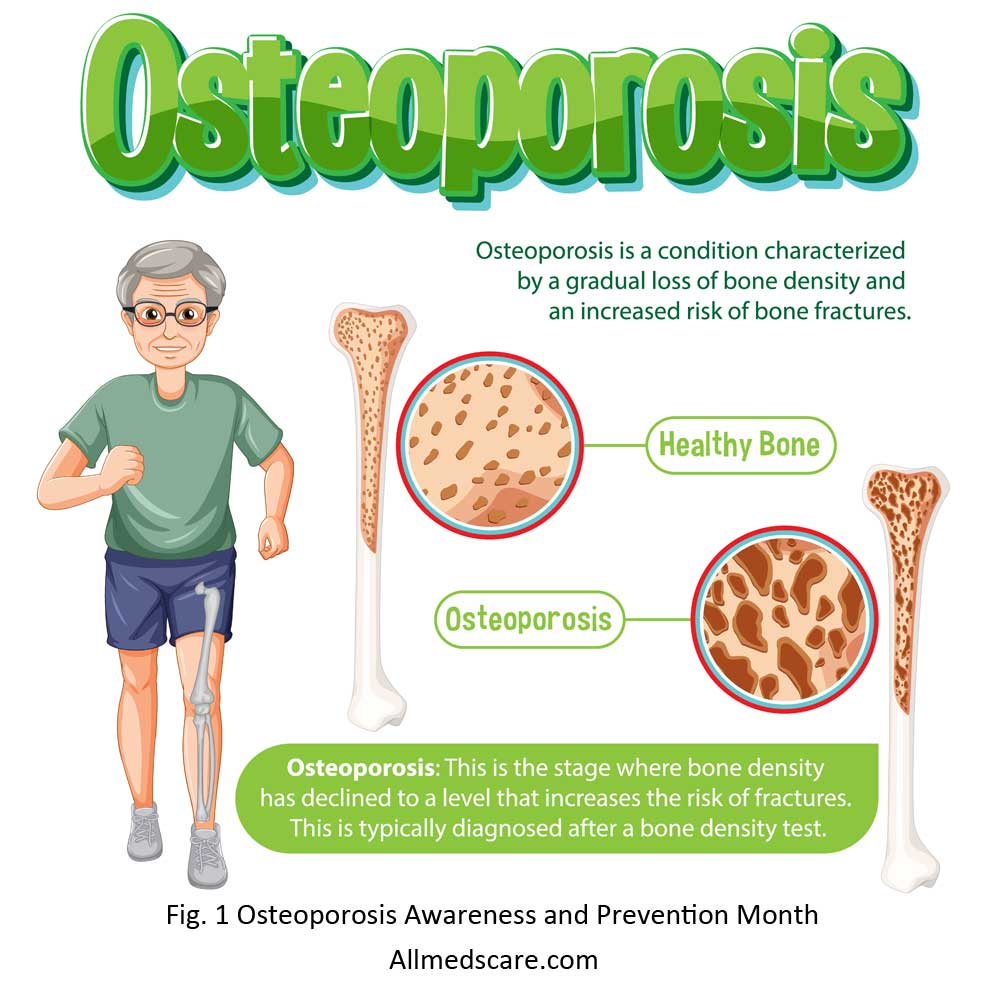
National Osteoporosis Awareness and Prevention Month: How to Keep Your Bones Strong and Healthy?
As we entering in May month, This month is dedicated to spreading awareness and prevention of Osteoporosis disease which is experienced by millions of people in the world. It is a disease that weakens bones and makes them more likely breakable. Women and men are affected by osteoporosis but women are more likely at a higher risk of increasing the disease. As per the National Osteoporosis Foundation (NOF), around 80% of women are affected by osteoporosis disease.
So, May is the month designated to raise awareness about National Osteoporosis Awareness and Prevention Month. This month is a good time to educate people about the risk factors and prevention measures that can help to reduce developing osteoporosis.

Risk Factors of osteoporosis:
There are lots of risk factors that can develop the risk of the disease. Some of the risk factors are manageable but others are not. Here is the list of risk factors.
- Age: As we get older, our bones are naturally weaker and thinner and making us more open to fractures.
- Gender: Women have a high chance of developing osteoporosis disease than men because of lower estrogen levels that happen during menopause.
- Family History: If anyone in your family has osteoporosis disease then highly chance of increasing it as well.
- Under Weight: Having an underweight or low body weight may increase the chance of osteoporosis issues.
- Medications: Certain medications including steroids and anticonvulsants are one of the risk factors to increase osteoporosis.
Prevention of Osteoporosis:
While there is no cure for osteoporosis but there are lots of preventive measures that can help to reduce the risk. The following are the effective preventive measure for osteoporosis.
- Catch Vitamin D and Calcium: Vitamin D and Calcium are the most effective and required factors for building strong bones. Foods that contain calcium such as leafy green vegetables, dairy products, and fortified foods like orange juice. Vitamin D can be get through sunlight and supplements.
- Exercise Daily: Exercise such as jogging, walking, swimming, and weightlifting are weight-bearing exercises that help to improve bones and reduce the risk of fractures.
- Don’t Smoke: Smoking has a harmful decrease in bone density and makes smokers more open to fractures.
- Reduce Alcohol Intake: Too much amount of alcohol consumption may lead to increased bone loss as well as the risk of fractures.
- Consult with a Doctor: If anyone is at high risk of developing this issue then you need to consult with your doctor as they recommend some medications or supplements to help reduces the disease.
How to Keep Your Bones Strong and Healthy
After a certain point in our life, we all feel a low bone density. Osteoporosis and fracture risk may increase as a result of this. However, there are steps we can do to stop this from happening and maintain the strength and health of our bones.
The significance of bone health will be covered in this article, along with advice on how to preserve it. In order to assist you in making educated decisions regarding your health, we will also dispel some widespread misconceptions concerning bone health.
The Importance of Bone Health
Our bodies’ framework, which offers support and structure, is made up of bones. Additionally, they store important minerals like calcium and phosphorus and safeguard our organs. Our bones are thinner and weaker as we age, which raises the chance of fractures and osteoporosis.
Bones that have osteoporosis become porous and brittle, which raises the possibility of fractures. Millions of individuals worldwide are impacted by it, predominantly women but also men. Osteoporosis can be treated with drugs, but prevention is always the best option.
Common Myths About Bone Health
- 1. Milk is the only way to get enough Calcium: Actually, milk is the best source of calcium, but that means it is not the only way to get calcium, there are other ways such as green leafy vegetables, almonds, tofu, and orange juice.
- 2. Calcium Supplements are always necessary: It’s vital to avoid taking too many calcium supplements, even if they can be beneficial for those who don’t get enough calcium from their diets. Kidney stones and other health issues can be caused by consuming too much calcium.
- 3. Only Women Get Osteoporosis: Men can also have osteoporosis, though women seem to get it more frequently. Men over 50 should discuss their risk of osteoporosis with their doctor.
Bottom Line
To maintain general health and quality of life, one must maintain bone health. You can lessen your risk of developing osteoporosis and fractures by obtaining adequate calcium and vitamin D, exercising frequently, quitting smoking, reducing your intake of alcohol and caffeine, and talking to your doctor about bone health. Keep in mind that the best course of action is always prevention.






